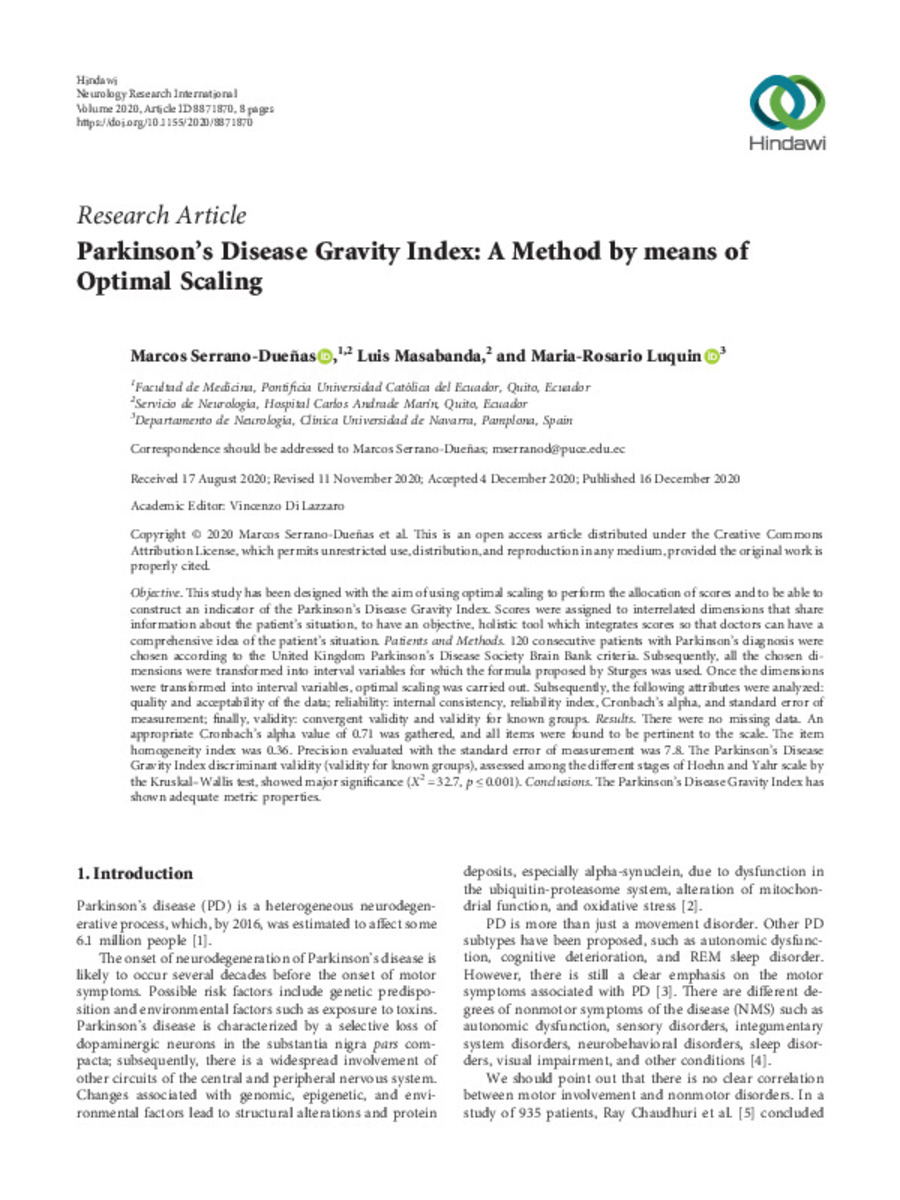Full metadata record
| DC Field | Value | Language |
|---|---|---|
| dc.creator | Serrano-Dueñas, M. (Marcos) | - |
| dc.creator | Masabanda, L. (Luis) | - |
| dc.creator | Luquin, M.R. (María Rosario) | - |
| dc.date.accessioned | 2023-09-27T10:34:30Z | - |
| dc.date.available | 2023-09-27T10:34:30Z | - |
| dc.date.issued | 2020 | - |
| dc.identifier.citation | Serrano-Dueñas, M. (Marcos); Masabanda, L. (Luis); Luquin, M.R. (María Rosario). "Parkinson's disease gravity index: A method by means of optimal scaling". Neurology research international. 2020, 2020, 8871870 | es_ES |
| dc.identifier.issn | 2090-1852 | - |
| dc.identifier.uri | https://hdl.handle.net/10171/67337 | - |
| dc.description.abstract | Objective: This study has been designed with the aim of using optimal scaling to perform the allocation of scores and to be able to construct an indicator of the Parkinson's Disease Gravity Index. Scores were assigned to interrelated dimensions that share information about the patient's situation, to have an objective, holistic tool which integrates scores so that doctors can have a comprehensive idea of the patient's situation. Patients and Methods. 120 consecutive patients with Parkinson's diagnosis were chosen according to the United Kingdom Parkinson's Disease Society Brain Bank criteria. Subsequently, all the chosen dimensions were transformed into interval variables for which the formula proposed by Sturges was used. Once the dimensions were transformed into interval variables, optimal scaling was carried out. Subsequently, the following attributes were analyzed: quality and acceptability of the data; reliability: internal consistency, reliability index, Cronbach's alpha, and standard error of measurement; finally, validity: convergent validity and validity for known groups. Results: There were no missing data. An appropriate Cronbach's alpha value of 0.71 was gathered, and all items were found to be pertinent to the scale. The item homogeneity index was 0.36. Precision evaluated with the standard error of measurement was 7.8. The Parkinson's Disease Gravity Index discriminant validity (validity for known groups), assessed among the different stages of Hoehn and Yahr scale by the Kruskal-Wallis test, showed major significance (X 2 = 32.7, p ≤ 0.001). Conclusions: The Parkinson's Disease Gravity Index has shown adequate metric properties. | es_ES |
| dc.language.iso | eng | es_ES |
| dc.publisher | Hindawi | es_ES |
| dc.rights | info:eu-repo/semantics/openAccess | es_ES |
| dc.subject | Indicator of the Parkinson's Disease Gravity Index | es_ES |
| dc.subject | Holistic tool | es_ES |
| dc.subject | Parkinson's Disease Society Brain Bank criteria | es_ES |
| dc.title | Parkinson's disease gravity index: A method by means of optimal scaling | es_ES |
| dc.type | info:eu-repo/semantics/article | es_ES |
| dc.description.note | This is an open access article distributed under the Creative Commons Attribution License, which permits unrestricted use, distribution, and reproduction in any medium, provided the original work is properly cited. | es_ES |
| dc.identifier.doi | 10.1155/2020/8871870 | - |
| dadun.citation.publicationName | Neurology Research International | es_ES |
| dadun.citation.startingPage | 8871870 | es_ES |
| dadun.citation.volume | 2020 | es_ES |
| dc.identifier.pmid | 33381314 | - |
Files in This Item:
Statistics and impact
Items in Dadun are protected by copyright, with all rights reserved, unless otherwise indicated.






